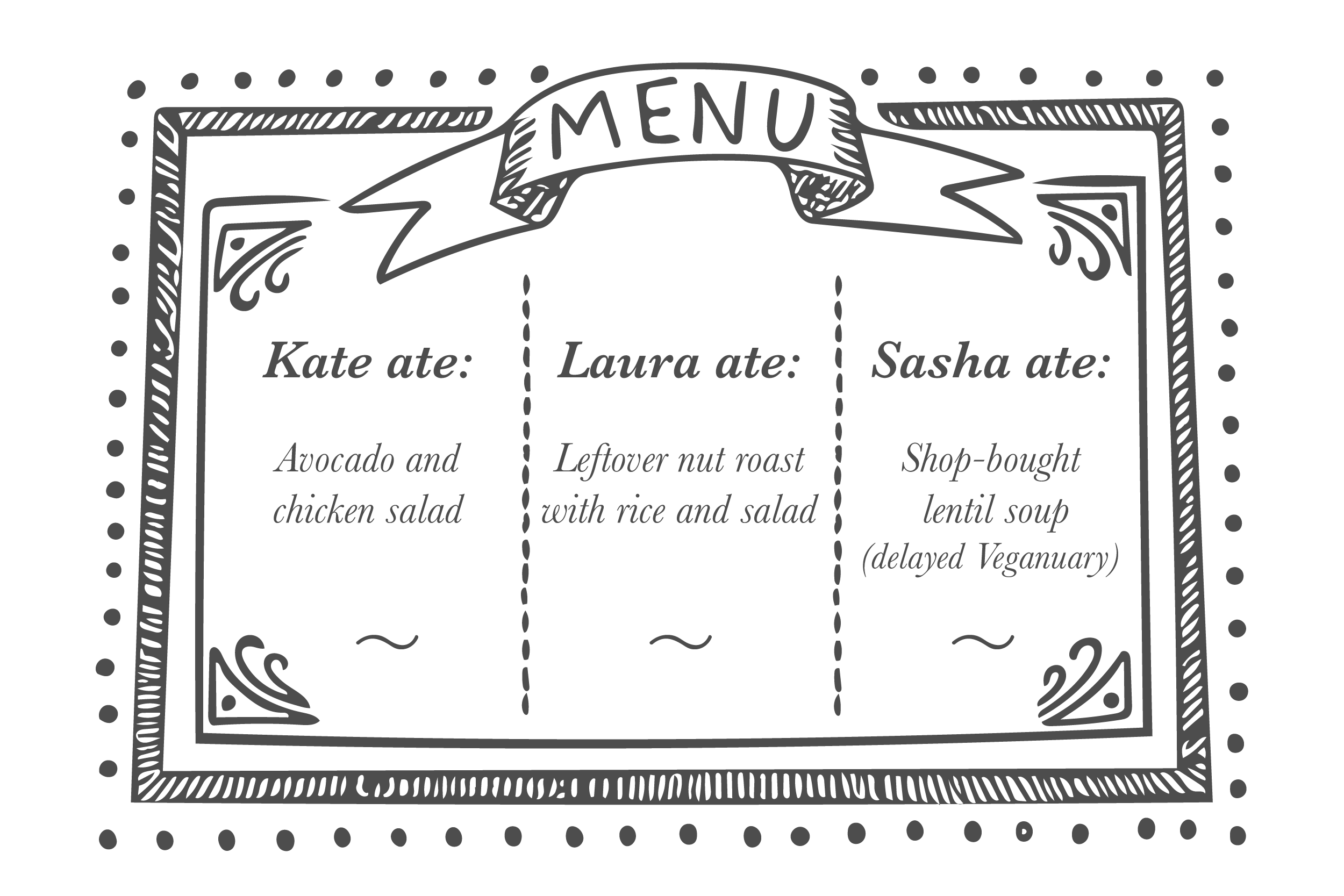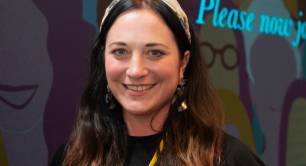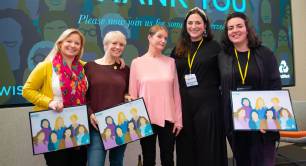Ladies who lunch: “We’re like chalk and cheese, but there's an awful lot of trust”
Ten years ago, nurses Laura Walker and Kate Smith turned their disillusionment with mainstream care into a high-impact, highly personal service for people affected by dementia. Over a virtual lunch, our WISE100 Social Business Leaders of the Year tell Pioneers Post about relying on ‘gut feeling’ and values when hiring staff, training prisoners to look after others with dementia – and why being sisters-in-law makes for a healthy business relationship.
Laura Walker (left) and Kate Smith (right) are mixing business with pleasure – and it’s working. The pair have known each other since they were 13, are sisters-in-law and, for the past 10 years, have also been business partners.
“We always clicked. We’re like chalk and cheese, but there's an awful lot of trust,” says Kate.
The pair are speaking to me from the hub and eatery they founded, Moments Café in central Plymouth. Ten years ago, both women were in very similar situations: nurses “working odd shifts” through agencies to afford them flexibility with their young children.
But a turning point that led to a new career for both.
“Laura rang me really fed up, and echoed something I’d been experiencing too – working in care homes, listening to people quite distressed who just need time with you,” says Kate. “We found it difficult to give the care we wanted because of time constraints.” With errands to run, medicine to distribute, and hundreds of patients to see to, there was never enough time to comfort people.

“These people were not living well, they were really just surviving. Often people with dementia are left to sit and do absolutely nothing,” says Laura. She knew it didn’t have to be like this: as a student nurse, she had previously worked in a place of “absolute excellence” in treating people with dementia, “seeing transformations” in people who were able to “live well and happily with the right support.”
The black folder
Laura knew there was a better way to treat these vulnerable people – but she also knew she couldn’t do it on her own. And that’s when her sister-in-law turned up to her house, already organised with a black folder tucked under her arm. She recalls: “Kate knocked on my door and said, 'Right, if we're doing this, let's do it properly!'”
Memory Matters SW CIC was born in 2010, designed to support people affected by dementia. It consists of three strands. One is Moments Café, which has the Memory Matters Hub, a drop-in information centre upstairs. The café has been open for three years and is “thriving” according to Laura, with almost 67,000 visitors in 2019. Income from the café helps the pair to run the building, provide one-to-one support and pay for their “growing” team of 27 staff, who work across all three aspects of the business.
Memory Matters also runs workshops for people with early to mid-stage dementia (pictured right). Funded by The Big Lottery (now The National Lottery Community Fund), there are 10 groups in Cornwall – allowing 85 people each week to access talking therapy. Cognitive stimulation therapy (CST) is proven to slow the progression of dementia, using the motto of ‘use it or lose it’. “The more we use [our brains], the more there is to lose – we try to create more connections so that dementia has more to get through,” explains Laura. The sessions follow the same structure each week, creating patterns and repetition, and involve reality orientation (reminding people of place, date, time), newspaper discussion, singing, and word or number games. The team has seen a 70-80% rise in cognition – the ability to acquire knowledge and understanding – from these workshops, and even when cognition levels stay the same, Laura explains that it’s just as “exciting that they’re not deteriorating”.
‘The more we use [our brains], the more there is to lose’
The third strand is training hospital staff to manage challenging behaviours in dementia. And they’re piloting some other more unusual training schemes too. Inside Project, running at Dartmoor Prison, is teaching prisoners how to care for other prisoners with dementia. They've supported the prison to open its own day centre, and Memory Matters facilitators are running 14 weeks of CST workshops with the aim, Kate explains, of leaving them “running it sustainably, so anyone who enters with dementia will then have therapy run by other prisoners”.
The business of nursing
After almost 10 years running a successful social enterprise – and after taking home one of the top awards at last year's NatWest WISE100 – you’d be forgiven for assuming that the co-founders already had some business expertise when they set up the venture. That wasn't the case. “Nursing is the opposite of business,” explains Laura. “It’s not about revenue, it’s just about caring. Working out how you do both has been the creative bit”.
‘It’s not about revenue, it’s just about caring. Working out how you do both has been the creative bit’
And the ‘creative bit’ has involved using their knowledge of and experience in the health sector and applying it to running a business. They didn’t take this approach from the outset, however. When Memory Matters first launched, Kate and Laura were recruiting staff based on the candidate’s experience of a specific role – similar to how most businesses would recruit. But something wasn’t quite right. They were hiring people who they instinctively knew were not a good fit, even if they ticked the boxes when it came to skills and experience. Kate sums up what was missing: “You’re never going to be a great fit when your values are completely different.” This is when they decided to start using values-based recruitment. “We had to make that gut feeling that we had measurable,” says Laura. “That’s how they recruit in social care.” Now, all staff are recruited based on their personality and on Memory Matters’ organisational values (people-focused, passionate, open, positive, creative and fun).
Above: Cognitive stimulation therapy (CST) is proven to slow the progression of dementia. At Memory Matters, sessions follow the same structure each week, creating patterns and repetition, and involve activities like newspaper discussion, singing, and word or number games.
When values are shared, it builds trust and respect. This was incredibly important for Kate and Laura – especially early on. “We did argue,” says Laura, “but you can’t walk away. You have to get through it. We now know how to address it as we know each other’s flare points.”
And over the past 10 years they’ve developed a dynamic that is working for them. “On the way home, I call Laura and we summarise the day and put it to bed,” explains Kate. Laura tells me that she meditates when she gets home (as well as in the morning). “I offload all my junk onto her and then she meditates!” jokes Kate.
Their healthy partnership means they have high hopes for Memory Matters. Laura shares: “I would like it to be national… Kate says international! I'd like to see our workshops up and down the country. We just know that they work.”
|
Key figures: Memory Matters
|
Thanks for reading our stories. As somebody working in the impact economy, you'll know that producing quality work doesn't come free. We rely on paid subscriptions and partnerships to sustain our purpose-led journalism – so if you think it's worth having an independent, specialist media platform to share your news, insight and debate across the globe, please consider subscribing. You'll also be buying social: Pioneers Post is a social enterprise itself, reinvesting all profits to help you do good business, better.
Header photo: Cognitive stimulation exercises at a Memory Matters workshop in Cornwall (all photo credits: Memory Matters SW).



